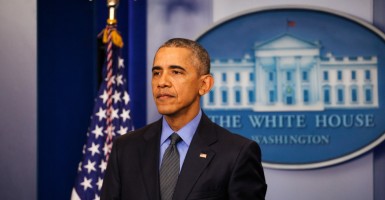The Justice Department announced last week that two individuals in separate cases in Texas and California are being charged with supporting terrorism.
While they have in common that they both came to the U.S. through the refugee system (from Iraq and Syria), it is important to note their differences: One suspect seems to have been radicalized here in the U.S., while the other was already radicalized when he was admitted. Both of these cases are concerning, but for two different reasons.
In the case of Omar Al Harden, who was arrested in Texas, Harden is accused of coming to the U.S. as a refugee in 2009 and then, in 2014, beginning to support ISIS. What causes an individual, who has been graciously allowed to flee a war-torn area where he was being persecuted, to five years later turn against the country that took him in?
Part of the answer can be found in how the U.S. assimilates immigrants. As Heritage’s Mike Gonzalez neatly lays out:
… as immigrants, refugees, asylees and others come and settle here we actually teach them that this is a racist, Islamophobic country and that they are victims… The decision by American elites to turn away from patriotic assimilation and pursue a multicultural model that perpetuates group differences—in effect, culturally and functionally segregates them—has created societal problems we will be dealing with for years.
The case of Aws Mohammed Al-Jayab, who was arrested in California, is concerning for a different set of reasons. Jayab entered the U.S. as a refuge in 2012, and, as seen in emails and private social media messages obtained via a warrant, he immediately began looking to return to Syria to fight for radical Islamist terror organizations.
He was even successful in getting to Syria in 2013 and returned to the U.S. in 2014.
As Heritage has described (here, here, and here), the refugee resettlement is an important but difficult process.
Any vetting process works to manage the risk that an individual may seek to enter the U.S. to do it harm, but this can never be a fail-proof solution.
As a result, we have called on Congress to demand that the administration present a thorough risk assessment on the refugee program and how they plan to deal with those risks.
FBI Director James Comey, DHS Secretary Jeh Johnson, and National Counterterrorism Center Director Nick Rasmussen, as well as numerous other officials from across a host of agencies, have testified on how risks from the refugee challenge are being handled, with additional scrutiny applied.
And while the U.S. has continually refined the refugee program in light of changing threats and challenges, the onus is on the administration to prove that what it is doing is keeping the U.S. safe.
And so Congress and many Americans are sincerely wondering: Given that Jayab slipped through the vetting process, is the refugee program secure enough?
When this issue first came to forefront several months ago, President Obama blasted those who expressed concerns over refugees as “un-American,” ”shameful,” “offensive,” “irresponsible,” and guilty of “political posturing,” condemning the idea the U.S. should “start equating the issue of refugees with issue of terrorism.”
While the U.S. should not equate refugees with terrorism, that does not mean we can pretend that there is no risk, either. Most refugees are truly in search of a better life away from persecution, but after the arrest of Jayab, the question should be put once again to the Obama administration—are you doing enough to keep America safe?
This time, Obama must actually address those concerns, not ridicule them as a bigoted, political stunt. And it’s up to Congress to determine if the administration’s answer is good enough.




























